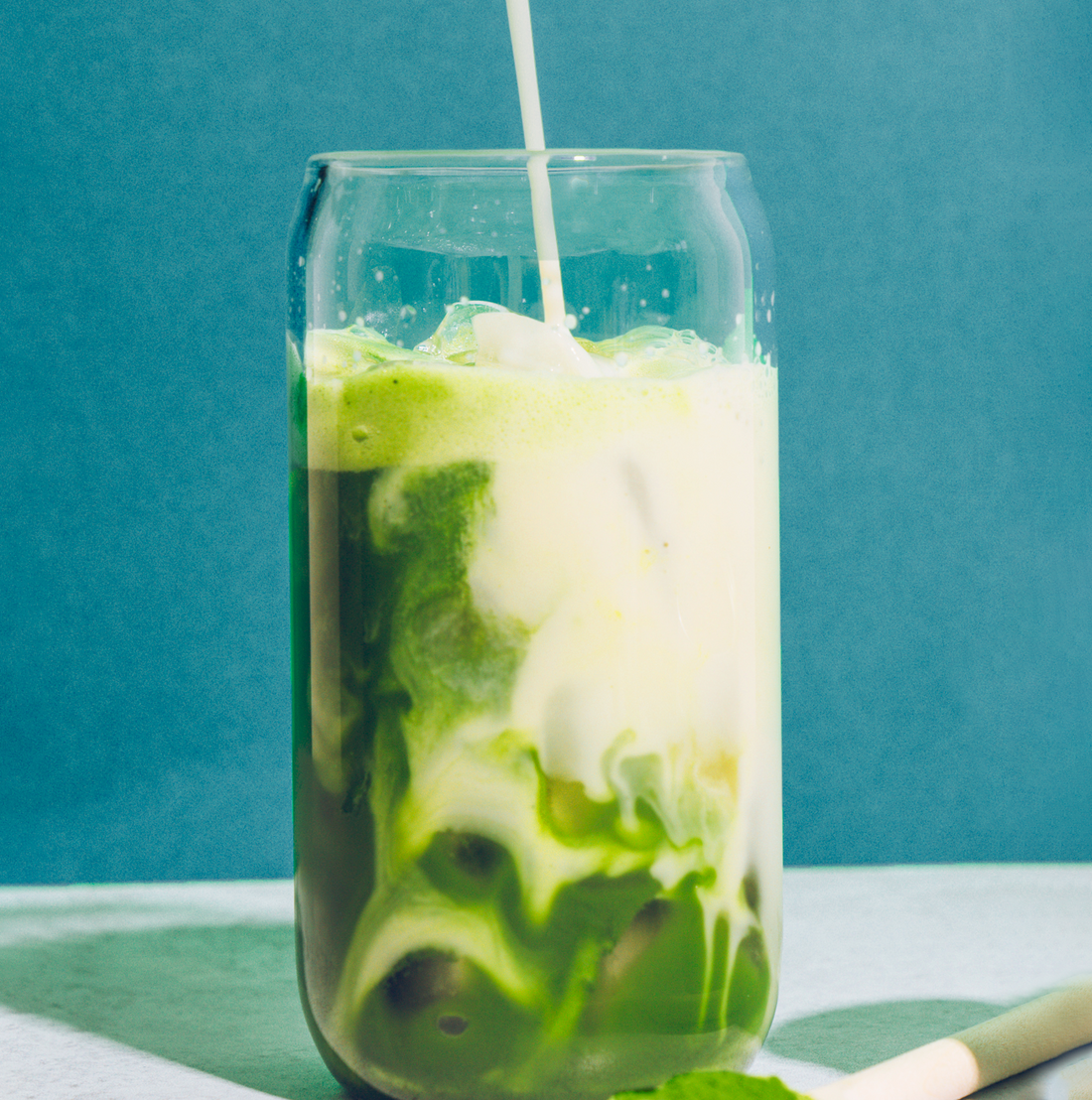Matcha and Caffeine: Unraveling the Energizing Elixir's Mystique
In the bustling world of energizing beverages, matcha stands as a beacon of serenity and vitality. Renowned for its vivid green hue and numerous health benefits, this powdered green tea has captivated enthusiasts and health-conscious individuals.
However, amidst the fervor for this vibrant elixir, questions arise about its caffeine content and how it compares to its caffeinated counterpart, coffee.
In this article, we delve into the caffeine content of matcha, its differences from coffee, and how it can invigorate your daily routine while nurturing your overall well-being.

Understanding Matcha's Caffeine Content
The allure of matcha lies in its unique cultivation and preparation, contributing to its exceptional caffeine profile. Matcha is derived from shade-grown tea leaves, which are harvested and ground into a fine powder.
This process enriches matcha with nutrients and antioxidants, including caffeine. While coffee typically boasts higher caffeine levels, the strength of matcha lies in its gradual, sustained release of energy.
Matcha contains caffeine in a balanced combination with other compounds, leading to a more gentle and enduring stimulant effect matcha caffeine has on the body.

What Affects the Caffeine Content of Matcha?
The caffeine content of matcha can be affected by several factors, including the following:
Tea Plant Varietal
The specific varietal of tea plant used to produce matcha can influence its caffeine content. Camellia sinensis, the tea plant, has different varietals, some of which naturally contain more caffeine than others.
Harvesting Time
When the tea leaves are harvested can also impact caffeine levels. Younger tea leaves tend to have higher caffeine content than older leaves. Matcha is typically made from the youngest leaves, which can have higher caffeine levels.
Shade-Grown vs. Sun-Grown

Matcha is often made from shade-grown tea leaves, which are covered with shade for several weeks before harvesting.
This process can increase the amino acid content, including L-theanine, and may reduce caffeine levels compared to tea leaves grown in full sunlight.
Processing
The way matcha is processed can affect its caffeine content. After harvesting, the leaves are steamed, dried, and then ground into a fine powder. The grinding process can influence the distribution of caffeine within the powder. Finer matcha powders may have slightly more caffeine than coarser ones.
Leaf Grade
Matcha comes in different grades, with organic ceremonial grade being the highest quality. Ceremonial grade matcha is made from the youngest, tenderest leaves and is considered to have a smoother, more delicate flavor.
Lower grades may include slightly older leaves and could have slightly different caffeine levels.
Brewing Method
The way matcha is prepared can also affect the caffeine content in your cup. If you use more matcha powder or hotter water, you may extract more caffeine from the powder.
Serving Size

The amount of matcha used per serving will directly impact the caffeine intake. A typical serving of matcha is about 1-2 grams of matcha powder, which contains varying levels of caffeine depending on the factors mentioned above.
Individual Variations
Caffeine content can also vary between individual tea plants, even within the same varietal and growing conditions.

How Much Caffeine Does Matcha Contain?
The caffeine content in matcha varies depending on several factors, such as the grade of matcha and the amount consumed. On average, one teaspoon of matcha powder contains approximately 30 to 70 milligrams of caffeine.
Comparatively, a standard 8-ounce cup of coffee typically contains around 95 milligrams of caffeine. The lower caffeine content in matcha makes it a preferred option for individuals seeking a milder energy boost without the jittery side effects often associated with coffee consumption.
How Caffeine in Matcha is different
Matcha and caffeine are often associated, but the way caffeine functions in matcha is different from how it operates in other sources like coffee, traditional steeped tea, and regular green tea. Here's why:
L-Theanine Content
Matcha contains a relatively high concentration of an amino acid called L-theanine. L-theanine has calming and relaxing properties that can counteract the jitteriness and anxiety that some people experience from caffeine.
The combination of L-theanine and caffeine in matcha green tea is believed to provide a more focused and sustained energy boost compared to the rapid spike and crash often associated with coffee.
Slow Release of Caffeine
Matcha's caffeine is released more gradually due to the way it's consumed. When you drink matcha tea, you're ingesting the entire tea leaf, which has been ground into a fine powder.
This means the caffeine is released into your system slowly over time, leading to a more sustained energy boost.
In contrast, coffee's caffeine is extracted quickly through brewing, leading to a faster onset of effects but potentially also a quicker crash.
Nutritional Profile

Matcha is rich in antioxidants, vitamins, and minerals due to the consumption of the whole tea leaf. These compounds, including chlorophyll and catechins, may interact with caffeine and influence how it's metabolized by the body, potentially contributing to the overall experience of energy and alertness.
Caffeine Content
While the caffeine content in matcha can vary, it's generally lower than in coffee. An average serving of matcha contains around 30-40 mg of caffeine, while a typical cup of coffee might contain around 80-100 mg of caffeine. This lower caffeine content in matcha can also contribute to its milder and less intense effects compared to coffee.
Cultural and Ceremonial Aspect

Matcha is often prepared and consumed as part of traditional Japanese tea ceremonies. This cultural context can influence the overall experience of consuming matcha, emphasizing mindfulness, relaxation, and a sense of well-being. This contrasts with the often fast-paced and utilitarian nature of coffee consumption.
In summary, the unique combination of L-theanine, slow caffeine release, nutritional profile, lower caffeine content, and cultural context sets matcha apart from other caffeine sources like coffee. The interplay of these factors contributes to the distinct energy and cognitive effects associated with matcha consumption.
Coffee vs. Matcha: The Energizing Duo

While both matcha and coffee offer a delightful energy boost, they differ in their journey to invigorate your senses. The caffeine in matcha is accompanied by an amino acid called L-theanine, which fosters a sense of calm and relaxation.
This unique combination results in an awakened, focused mind without the restlessness often experienced with coffee's caffeine rush. Moreover, matcha's inherent nutrients, like antioxidants and chlorophyll, enhance its overall health-promoting properties.
Embracing Matcha for a Balanced Buzz
The beauty of matcha lies in its versatility and adaptability to various culinary delights. From traditional matcha tea ceremonies to modern-day matcha lattes, smoothies, and matcha-infused treats, there are endless ways to incorporate matcha into your daily routine.
Its balanced caffeine release provides a gentle and sustained buzz, making it an ideal companion for moments that call for focused productivity or peaceful relaxation.
Conclusion
As you venture into the world of matcha, the caffeine content and its differences from coffee offer valuable insights.
Matcha's unique cultivation and preparation contribute to its balanced caffeine profile, fostering a harmonious blend of calm and focus.
Whether you choose to enjoy matcha in its traditional form or explore its innovative culinary uses, this green elixir promises an uplifting and nurturing experience.
Embrace matcha as a delightful companion in your journey towards enhanced well-being and a revitalized sense of tranquility and vigor.




